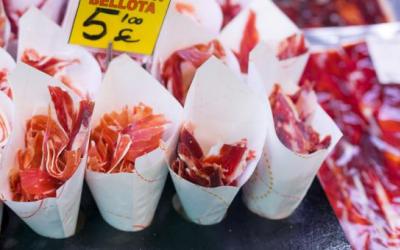Which countries have a tax on "junk" food

In RUSSIA, from July 1, 2023, an excise tax on sweet drinks is in effect in the amount of 7 rubles per 1 liter. But Russia is not the first and most likely not the last country to introduce such a measure in an effort to improve the HEALTH of the nation. Sfera.fm found out which other countries introduced a similar tax , and also limited the advertising of unhealthy food.
How countries tax junk food
Denmark
In 2011, Denmark became one of the first countries to start tackling obesity through taxation by imposing a surcharge on foods containing more than 2.3% saturated fat. This measure, in particular, increased the cost of a 250-gram package of butter by 2.2 crowns (24 cents). However, the country's authorities backtracked and canceled the tax amid criticism: opponents of the tax said that the measure led to higher food prices and even endangered jobs in Denmark.
Hungary
Hungary in 2011 also began to fight the obesity of citizens: a new tax was imposed on a wide range of foods high in SALT and SUGAR. The government has calculated that the excises will bring additional revenues to the budget in the amount of about 20 billion HUF (about 50 million euros).
Did it work? Yes. An assessment of the impact of the tax four years after its introduction showed that up to 73% of consumers reduced their consumption of target products. Of those, more than two-thirds chose a healthier alternative, the most common of which were mineral water, fresh fruits and vegetables, homemade sweets, herbs and spices.
Mexico
In 2013, Mexico introduced an 8% tax on a wide range of essential foods as part of its efforts to combat rising levels of obesity. The tax was imposed on any food whose calorie content exceeded the threshold of 275 calories per 100 grams. In addition, the government introduced a 10% tax on sugar-sweetened soft drinks.
As it later turned out, the tax did result in a 5.8% decrease in purchases of taxed food among middle-class households and 10.2% among households from poorer socioeconomic backgrounds. However, three-quarters (73%) of the Mexican population is still obese, one of the highest rates in the world.
India
In 2016, the Indian state of Kerala became the first in the country to introduce a so-called "fat tax", raising the tax on burgers, pizza, tacos and donuts sold in chain restaurants by 14.5%. The move was in response to recent changes in eating habits in the state, with fast food chains opening branches for the first time and locals replacing traditional foods with more readily available "junk food". It is not clear whether the tax helped achieve its goal. Within a year, and before any proper study of its effectiveness could be done, it was abolished as a result of national changes in taxation in India.
In April 2018, a tax on high-sugar soft drinks went into effect in the UK . If the amount of sugar in the drink exceeded 8 g per 100 ml, then the manufacturer paid 24 pence per liter to the treasury. And if the volume of sugar was from 5 to 8 g per 100 ml, then the excise tax was 18 pence per liter. The measure was expected to bring in £240m in its first year, well short of the original estimate of £520m after 50% of manufacturers reportedly started reformulating their products.
This measure is currently working. Public Health England's first year progress report showed that 11% of beverage brands have reduced their sugar content. In addition, there has been a shift in sales towards products with less than 5 g of sugar per 100 g, i.e. those that are not taxed.
The history of the junk food tax fight
The first such taxes were introduced in the United States in the 1920s. However, even then, the tax on oleomargarine - an artificial oil that is made from animal fat - was criticized, since this measure was more likely to fight "artificial" products, rather than harmful natural products. Although the tax was focused on the health of citizens, its main focus was on the purity of food, and not on its nutritional properties, that is, the content of sugar or fat.
In 1942, the American physiologist A.J. Carlson proposed charging for every pound of excess weight, both to combat "bad luxury" and to provide more food for the war effort. The concept was revisited by Milton Merriweather and P. Franklin Alexander in the late 1970s, but became well known in the early 1980s when it was revisited by Kelly D. Brownell, DIRECTOR of the Center for Food Policy and Obesity at Yale University. . Brownell proposed using junk food tax revenue to subsidize the production of healthier foods.
Which countries restrict junk food advertising?
Ads for fatty, salty, sugary and other foods commonly considered unhealthy are also restricted in some countries.
Great Britain. In this country, it is forbidden to advertise products with a high content of salt, sugar and fat on television during the evening prime time - from 18:00 to 21:00.
Norway and Sweden. There you can not advertise harmful products in television programs aimed at children.
CANADA . In the Canadian province of Quebec, back in 1980, a law was passed that prohibited children under 13 from advertising junk food. It is believed that he led to the fact that the consumption of fast food in the region decreased. At least in Quebec, when compared to other Canadian provinces, there is the lowest level of obesity among children.
South Korea . In 2008, the country passed a law that prohibited advertising junk food on TV from 17:00 to 19:00 - it is believed that at this time mainly children sit in front of blue screens . It was originally planned that the restriction would be valid for three years, but the ban is regularly extended and exists to this day.
Chile. Here you can advertise harmful products on television and radio only at night - from 22:00 to 6:00. This is done so that children do not see such advertising. In Chile, it is also illegal to use cartoon characters to advertise unhealthy food and sell it near schools. In addition, manufacturers of such products must place special labels on the packaging indicating harm to health.
According to WHO, in 2020, 39 million children under the age of 5 were overweight or obese.
Nigeria. Before food ads reach the media, they are approved by a government regulator—and junk food ads are usually not censored.
Singapore. It is forbidden to promote drinks with a high sugar content to young people.
Read together with it:
- A fire at the Merci Agro Sakhalin pig farm killed 1,500 pigs, but pork production will not be affected.Deputy Minister of Agriculture and Trade of the region Inna Pavlenko noted that other pig farms will help compensate for the loss. Merci Agro Sakhalin plans to restore its capacity and livestock, which will help avoid a pork shortage on the local market. The restoration will be funded by insurance payments, and veterinarians have already analyzed the condition of the remaining animals and determin...
- From breeding stock to processing: the entire chain for your farm at the AGRAVIA exhibitionFrom January 21 to 23, 2026, the entire agricultural industry will gather in Moscow: the international exhibition AGRAVIA will present modern production and processing technologies for agricultural professionals. This is a refreshed version of the renowned AGROS and AGROTECH Expo exhibitions, but now the thematic exhibits focus on the entire production chain—from field and farm to processing. Cont...
- The IEA sees a risk of a decline in oil production in Russia due to sanctions.The IEA sees a risk of reduced oil production in RUSSIA due to US sanctions , but maintains its production forecast. According to the IEA, Russian oil exports will remain unchanged.There is a "significant downside risk" to Russia's oil production forecast due to US sanctions, the International Energy Agency (IEA) said in a report.BLOOMBERG . The agency's experts believe that the latest US sanction...
- UniCredit заявил о галактических усилиях из-за санкций против РоссииUniCredit старается не нарушить «более 15 тыс. санкций», а также не «совершать ошибки», которые позволят изъять его активы в России, заявил гендиректор. После начала военной операции банк начал рассматривать возможность ухода Итальянский банк UniCredit прилагает «галактические усилия», пытаясь соблюсти международные санкции в отношении своего российского подразделения. Об этом заявил генеральный д...
- He crawled to the icon with prayer. The true story of a man who overcame drug addiction.Alexander Ovchinnikov. Topic News. Our project's hero was a drug addict for many years. The thought that this was a dead end never left him, but his addiction proved stronger. One day, when he could no longer walk, he crawled to an icon in prayer. This became his first step toward a new life. Today, he heads a charity center that helps those who have given up hope and are unable to quit ALCOHOL an...



























































